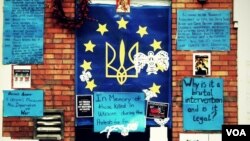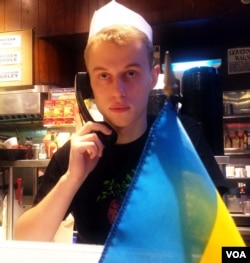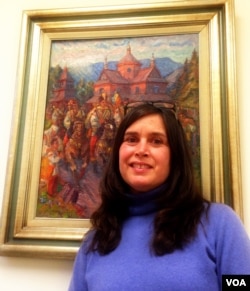NEW YORK —
At Veselka, a diner in New York City's East Village favored by Ukrainian expatriates, Pavlo Kaidan admits that his anxiety over the fate of his homeland 7,000 kilometers away is hard to bear.
“I am calling over there sometimes two times, sometimes three times a day just to ask how everything is and to what is going to be," he said. "Because every day my mom says ‘okay maybe tomorrow they [are] going to cut down the Internet; they’re going to shut down the phone service.’ You don’t know what’s going to happen. We are worrying about this.”
Vitalii Desiatmychenko, who returned from Kyiv, Ukraine's capital last week, says recent events confuse him.
“The situation is a little strange because Russian army got into Ukraine pretending to protect Russian people in Crimea, in the eastern part of Ukraine," he said. "But as far as I know, a lot of Russian speaking people, they still support the idea of Ukrainian people joining the European Union; they don’t want to join Russia.”
Tamara Olexy, president of the Ukrainian Congress Committee of America, an umbrella group that represents the million or so Americans of Ukrainian descent, says there are several actions American leaders should take.
“First and foremost, they have to be vocal in their protests against what Russia is doing," she said. "Second, they have an opportunity with the upcoming G8 [Summit] being held in Sochi, first to boycott Sochi. Secondly, in my opinion, they should get rid of Russia in the G8, and it should become the G7 again because it [Russia] has broken every international norm a democratic country should have.”
In Olexy's view, sanctions are another strategy.
"Visa restrictions and freezing the assets of the Russian elite that has actually ordered the invasion in Ukraine,” she said.
Hanya Krill Pyziur of New York’s Ukrainian Museum thinks that even the toughest sanctions will not work as long as Russian President Vladimir Putin is in power.
In her view, Putin ultimately wants Ukraine to come under Moscow's control, as it was during the Soviet era. She says he wants to ensure his historical legacy by securing Russia’s place as the leader of a Eurasian union, equal with the West.
“And because you have this desire to really control Ukraine and make it part of this union 'no matter what,' and then you have the Ukrainians in Ukraine who want their independence 'no matter what,' you have two ideas that are never going to converge; I think they are non-negotiable and I think it could very well lead to war,” she said.
In Ukraine, tensions continue to escalate. On Tuesday, in what many perceived as a veiled threat, President Putin said Russia would resort to force “only as a final resort.” Meanwhile New York’s Ukrainian-American community continues to watch and wait.
“I am calling over there sometimes two times, sometimes three times a day just to ask how everything is and to what is going to be," he said. "Because every day my mom says ‘okay maybe tomorrow they [are] going to cut down the Internet; they’re going to shut down the phone service.’ You don’t know what’s going to happen. We are worrying about this.”
Vitalii Desiatmychenko, who returned from Kyiv, Ukraine's capital last week, says recent events confuse him.
“The situation is a little strange because Russian army got into Ukraine pretending to protect Russian people in Crimea, in the eastern part of Ukraine," he said. "But as far as I know, a lot of Russian speaking people, they still support the idea of Ukrainian people joining the European Union; they don’t want to join Russia.”
Tamara Olexy, president of the Ukrainian Congress Committee of America, an umbrella group that represents the million or so Americans of Ukrainian descent, says there are several actions American leaders should take.
“First and foremost, they have to be vocal in their protests against what Russia is doing," she said. "Second, they have an opportunity with the upcoming G8 [Summit] being held in Sochi, first to boycott Sochi. Secondly, in my opinion, they should get rid of Russia in the G8, and it should become the G7 again because it [Russia] has broken every international norm a democratic country should have.”
In Olexy's view, sanctions are another strategy.
"Visa restrictions and freezing the assets of the Russian elite that has actually ordered the invasion in Ukraine,” she said.
Hanya Krill Pyziur of New York’s Ukrainian Museum thinks that even the toughest sanctions will not work as long as Russian President Vladimir Putin is in power.
In her view, Putin ultimately wants Ukraine to come under Moscow's control, as it was during the Soviet era. She says he wants to ensure his historical legacy by securing Russia’s place as the leader of a Eurasian union, equal with the West.
“And because you have this desire to really control Ukraine and make it part of this union 'no matter what,' and then you have the Ukrainians in Ukraine who want their independence 'no matter what,' you have two ideas that are never going to converge; I think they are non-negotiable and I think it could very well lead to war,” she said.
In Ukraine, tensions continue to escalate. On Tuesday, in what many perceived as a veiled threat, President Putin said Russia would resort to force “only as a final resort.” Meanwhile New York’s Ukrainian-American community continues to watch and wait.










